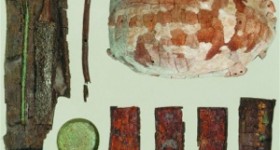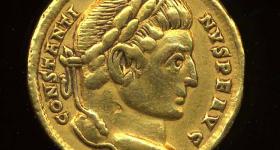Professional Skills for Ancient Historians, Classicists and Archaeologists
The study of the classical world may look obsolete in the eyes of the close-minded but, in fact, it has never been timelier. The restructuring of modern societies, the declaration of semi-religious wars, the economic crisis… they all resemble comparable incidents that took place in the past. A student of classical antiquity can easily make parallelisms and learn from previous mistakes, which is a lot more than what government officials can claim. Since the graduate of ancient history, archaeology or classics is able to assess more accurately current events and adjust easily to the changes of our time, s/he will always have an advantage over the ones who struggle to comprehend the intricacies of modern life.
In professional terms, the skills acquired during undergraduate studies are invaluable in the search for a job and the subsequent building of a fulfilling career. My lecturing job in the School of Archaeology and Ancient History at Leicester for the last five years helped me become aware of the practical skills our students develop over time. I will provide here a list, so that the prospective candidates of a job can use them for the construction of their curriculum vitae.
• Communication. By the time undergraduates complete their studies they probably wrote enough essays to make up an entire book. I always insist that the style should be lucid and fun, so that I do not struggle through the manuscript while I am making corrections. I consider the development of writing skills as one of the most important aspects of their BA. In addition, we all demand that our students indulge in oral presentations of their work in front of the class. Fluency and coherence are graded highly, while shyness and awkwardness are discouraged.
• Information Technology. Studying the past does not mean that, in the process, you will use only ancient tools. On the contrary, technological skills are necessary for the analysis of the evidence and their presentation. Especially archaeology students are some of the biggest computer geeks I know. Classicists may occasionally complain about the advances of technology but they always indulge in the compilation of bibliographical databases, the search of online archives and the use of visual aids during their written or oral presentations. And as if IT skills are not enough, mathematics enters also the equation in the form of statistical analysis of the ancient material.
• Team working is another aspect of the degree. It may involve the joint development and presentation of a written project or the conduct of an archaeological excavation. Either way, students are encouraged to cooperate with their peers and their supervisors in an agreeable manner. They learn to avoid friction, follow advice, come up with ideas that would benefit the team and resolve arguments. And we all know how many arguments may arise during fieldwork!
• Problem solving cannot be underestimated. The students learn how to address historical or archaeological problems by using the available material evidence, ancient written sources and secondary literature. In all cases, they use their critical thinking and developing imagination in order to reconstruct events that happened hundreds or thousands of years ago.
• The ability to work under pressure and meet deadlines is another skill we insist on. Deadlines for handing the essays or completing the degree are set in stone (with the exception of illness or death, of course). In order to organise themselves better in order to comply with the regulations, the students develop project and personal management skills.
• My favourite skills are the ones our students develop during their year abroad. As Exchanges coordinator, I am responsible for sending students to foreign universities for the duration of a year. During this time, they become adventurous, more independent, confident human beings with a variety of new interests. They learn a new language, they adopt a new lifestyle, they become more tolerant of other cultures and people. By the time they return to Leicester to recommence their studies, they are more mature and more determined to achieve their goals.
If you have any other skills in mind, please, add them in the comments. I am sure future graduates will appreciate them immensely!




Unfortunately, I can’t mention any other skills. But I will write about one that you mentioned. The “meeting deadlines” skill. When I was studying for my MA 11 years ago, we had to write 9 essays over the academic season. So we had 9 deadlines each. There were 13 students in the classroom, including me. So that makes 13×9=117 deadlines. Do you know how many of these deadlines were actually met? Only 10-15, including my three. I felt like an idiot, trying to write a good paper under pressure, when pretty much eveyone else was like “no rush, we have time”. So I would leave this skill out of the list!
You are refering to UCL practices of almost a decade ago. The School of Archaeology and Ancient History at Leicester follows different practices. Only the Hand of God may save the culprit who does not submit his/her essay on time! And I mean it!
This blog has been very encouraging to me in times when I have begun to doubt my choice in study and subsequent career opportunities.
I am about to undertake a degree in Ancient History in Sydney, Australia and have found this blog post, as well as another of yours on career prospects, integral in recent times in reaffirming my decision to follow what I once considered only a hobby and past time into what could be a career I only ever dreamed of.
Thank you for these blog posts; my love of history and research and my yearning to work overseas and experience other cultures has been, in part, strengthened by what you have had to say. It is encouraging to learn that my other passion (being a geek) can be very helpful in my further endeavours and that my degree opens up many other diverse career paths, other than those directly tied to history.